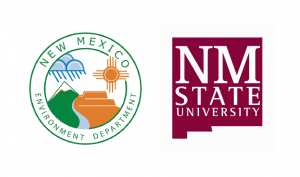CONTACT: Justin Bannister, 575.646.3221, jbannist@nmsu.edu and Maddy Hayden, Communications Director New Mexico Environment Department 505.231.8800 | maddy.hayden@state.nm.us 
Gov. Michelle Lujan Grisham on Thursday announced the New Mexico Environment Department (NMED) and New Mexico State University (NMSU) have entered into a memorandum of understanding, which will create a produced water research consortium. Through this consortium, New Mexico will continue to lead the country in advancing scientific and technological solutions related to the treatment and reuse of produced water generated by the oil and gas industry.
The consortium will develop a framework to fill scientific and technical knowledge gaps necessary to establish regulations and policies for the treatment of produced water. Such regulations and policies must be protective of public health and the environment while encouraging the oil and natural gas industry to rely less on freshwater and more on reuse of produced water. The memorandum of understanding spurs economic investment opportunities in New Mexico through NMSU, which will rely on public and private funding to carry out this research.
“New Mexico’s innovation in this area is and will continue to be the envy of other states,” Gov. Lujan Grisham said. “Turning this waste product into a commodity is good for preserving freshwater resources, good for compact requirements with other states, good for conservation purposes, good for local and county governments; it’s good for small and large producers, it’s good for agriculture. It’s good for New Mexico, and it represents an exciting leap forward.”
“The multidisciplinary research approach that we are proposing is specifically needed to fill existing data gaps to inform policy decisions,” said NMSU Chancellor Dan Arvizu. “This is particularly true in the domain of produced water, where the understanding of reuse for purposes beyond hydraulic fracturing is lacking. NMSU is excited to be at the very forefront of research in this area.” “Our state is continuing to take unprecedented steps forward to spur economic investment in furthering the science and technology associated with produced water and its potential treatment and reuse,” said NMED Cabinet Secretary James Kenney. “Through this partnership, science will guide our regulatory decision-making with respect to produced water treatment.”
House Bill 546, which includes the Produced Water Act, went into effect July 1, 2019. This law provides much needed jurisdictional and legal clarity over produced water in New Mexico and encourages the oil and natural gas industry to favor reuse, recycling and treatment options instead of relying on New Mexico’s limited freshwater resources.
“As New Mexicans, we know water is our most precious natural resource. I sponsored this legislation to save freshwater by clarifying and strengthening the rules for produced water while promoting investment and innovation in treating produced water,” said Rep. Nathan Small, a sponsor of the bill along with Reps. Brian Egolf and Rod Montoya. “I am grateful and excited to see this strong partnership between NMSU and NMED to provide the science we need to safely make decisions on the best ways to utilize recycled and treated produced water.” “
This session, we were proud to pass the Produced Water Act so we can have more transparency and accountability in the treatment and reuse of produced water resulting from oil and gas operations. I want to thank the governor, NMSU and NMED for their continued commitment to ensuring we have research-based systems, standards and guidelines for the management of produced water recycling,” said Speaker of the House Egolf. “These important efforts will help New Mexico lead the nation in saving freshwater for future generations.”
The expertise of NMSU and NMED will be augmented by consortium members from academia, national laboratories, the private sector, non-governmental organizations and state and federal agencies. NMSU will manage the consortium membership and process, with some assistance from NMED.
“By leading the country in creating science-based standards for treated produced water, NMSU and NMED will help us be responsible stewards of New Mexico’s resources, from oil and gas to water,” said Rep. Micaela Cadena, who was integral in facilitating the partnership between NMED and NMSU. “I am proud of NMSU and our partnership with NMED; together we will lead the nation with timely and crucial research on treated produced water.”
Produced water is defined in the Produced Water Act as “fluid that is an incidental byproduct from drilling for or the production of oil and gas.” Most produced water is naturally occurring, highly saline water that is recovered during oil and gas production. Produced water may also include fluids that were used during drilling, such as hydraulic fracturing fluids. Over 42 billion gallons of produced water were created in New Mexico’s Permian Basin in 2018 alone.
The most common method of produced water management is disposal by underground injection, a practice that has been known to cause earthquakes in other oil-producing states.
To learn more about NMED’s produced water efforts and sign up for updates, visit https://www.env.nm.gov/newmexico-produced-water/.